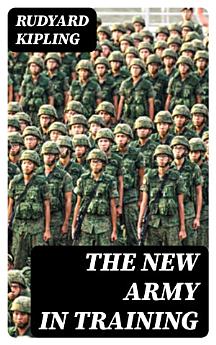The New Army in Training
Sep 2022 · DigiCat
Ebook
35
Pages
family_home
Eligible
info
reportRatings and reviews aren’t verified Learn More
About this ebook
Rudyard Kipling's 'The New Army in Training' provides a meticulous examination of the British military's metamorphosis during a pivotal era. With the precision of a journalist and the flair of a seasoned storyteller, Kipling captures the zeitgeist of a nation preparing for the monumental struggle of the First World War. The text is both a historical artifact and a literary piece, showcasing Kipling's characteristic blend of reportage and rich descriptive prose, and providing insightful context into the military and sociopolitical milieu of the time. Readers are not only furnished with a detailed glimpse into the machinations of military training but are also offered a narrative that weaves the fervor and anxieties of a country on the brink of change. Rudyard Kipling, renowned for his works such as 'The Jungle Book' and 'Kim', brings to 'The New Army in Training' an undercurrent of imperialistic pride and a profound understanding of British colonial sentiments. A Nobel laureate, Kipling's engagement with British identity, the machinery of empire, and the lives of soldiers is deeply personal, spurred perhaps by his own experiences and his son's military service. His writing here is not just informed by his literary prowess, but also shaped by the socio-cultural dynamics and the patriotic fervor that defined early 20th-century Britain. 'The New Army in Training' is thus not just for readers of military history but also for those who appreciate literary skill and socio-historical analysis. It offers an intimate portrait of an epoch and is recommended for anyone seeking a deeper appreciation of Kipling as a commentator on his times. The republication by DigiCat Publishing ensures that this classic remains accessible and continues to engage minds desiring to understand the complexities of history through the lens of literature.
About the author
Rudyard Kipling (1865-1936) was an English journalist, short-story writer, poet, and novelist, born in Bombay, British India. Kipling is often regarded as an innovator in the art of the short story, and his children's literature is celebrated for its deep moral insights and narrative vitality. His early work in India, where he worked for local newspapers, served as a foundation for his understanding of imperialism and the complexities of Indian society. Kipling gained international fame with works like 'The Jungle Book' (1894) and 'Kim' (1901), which interweaved rich storytelling with a keen perception of political and cultural dynamics. In 'The New Army in Training', Kipling offered a contemplative perspective on the buildup of British forces during World War I, reflecting the era's militaristic spirit and the author's own imperialistic views. He was renowned for his mastery of language and narrative form, often blending the exotic and the mundane, the fantastical and the historical. In 1907, Kipling became the first English writer to receive the Nobel Prize in Literature, hailed by the Swedish Academy as the author of 'observant prose that takes its form from the heart and thought of the people'. Despite the subsequent critical debates surrounding imperialism in his works, Kipling's storytelling prowess continues to be influential in the literary canon.
Rate this ebook
Tell us what you think.
Reading information
Smartphones and tablets
Install the Google Play Books app for Android and iPad/iPhone. It syncs automatically with your account and allows you to read online or offline wherever you are.
Laptops and computers
You can listen to audiobooks purchased on Google Play using your computer's web browser.
eReaders and other devices
To read on e-ink devices like Kobo eReaders, you'll need to download a file and transfer it to your device. Follow the detailed Help Center instructions to transfer the files to supported eReaders.








